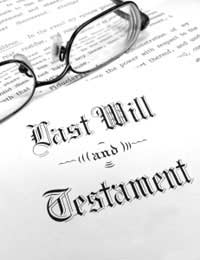Leaving Money to Charity: Step by Step Guide

A large proportion of people choose to leave a portion of their estate to a charity, or a number of charities. This is a popular way of ensuring that the best possible use is made of the money you leave behind.
But leaving money to charity is not necessarily as easy as you might think. The process needs to be completed in a specific way in order to be successful – and you may need to take legal advice.
Choose your charity
You may already have a charity in mind. Many people, however, know that they want to leave some of their money to a good cause, but are unsure which charity to choose. In these cases, you may want to request some literature from a range of charities. They should be able to explain exactly how your money will be spent. If you are worried about your cash being eaten up in office expenses and other bureaucracy, you might consider ordering annual reports. These should give breakdowns of the charities’ annual expenditures.Assess your estate
Before you begin the process of gifting, you need to assess what you will have to offer. It is remarkably common for people to bequeath more than they actually end up having in their estate, and this can cause obvious problems.If you are in any doubt, or if your financial affairs are particularly complex, you should consider asking a professional to value your estate for you.
Choose a legacy type
There is a range of different legacy types, and each of these may be suitable in a different situation. In a residual legacy you leave a proportion of what is left of your estate after all other costs and liabilities have been met. In a specific legacy you leave a specific asset to the charity. In a pecuniary legacy you leave a set amount to the charity.Pecuniary legacies are generally discouraged, as their value is reduced by inflation between the time at which you make your will and the time at which the charity receives the gift. Residual legacies are generally the most popular amongst charities, as their value rises in line with the value of your estate as a whole. You should speak to a solicitor when writing your will, who will be able to explain the correct wording for each type of legacy.
Detail the charity properly
A worryingly large proportion of people leaving money to charities in their will fail to give proper details of the relevant organisation. Many presume that it is enough to simply give the name of the charity, but this is often not the case.Instead, you should give the name, registered address, and registered charity number of the organisation. You should also consider inserting a clause stating that the money should still be donated in the event that the charity changes its name or is merged into another organisation.


Re: How to Trace Whereabouts of Trust Funds?
I was involved in a car accident when I was younger and I’m now 18 and I was awarded £3,000 and my parents cannot…
Re: How to Trace Whereabouts of Trust Funds?
I’m trying to locate details of a trust fund which was left by my younger brother with my parents being the…
Re: Revocable and Irrevocable Trusts
I have trust but my step brother went behind my dad back and change the final trust. Now he refuses to tell us if the trust…
Re: How to Trace Whereabouts of Trust Funds?
Hi I am looking for a trust fund,that I think my dad left is half of the house in ,my step mother didn't go into…
Re: Can Conditions Be Put Into Adult Children's Trust Funds?
Hi, can you help. my father was killed in a road accident in October 1966. My grandfather…
Re: Reasons for Establishing a Living Trust
are there any inheritance tax ramifications when creating a 'living trust'.
Re: What is Absolute Entitlement?
My mother’s will has the word absolutely after each beneficiary name. My sister has died since but the estate has been delayed…
Re: Implied and Express Trusts
My father (ZML) and stepmother (JNL) wrote joint wills which each contained a testamentary trust. I was named executor and trustee.…
Re: How to Trace Whereabouts of Trust Funds?
Hello i am trying to locate a trust that i think my mother is hiding from me
Re: How to Trace Whereabouts of Trust Funds?
Hello i am trying to locate a trust that my mother is hiding from me